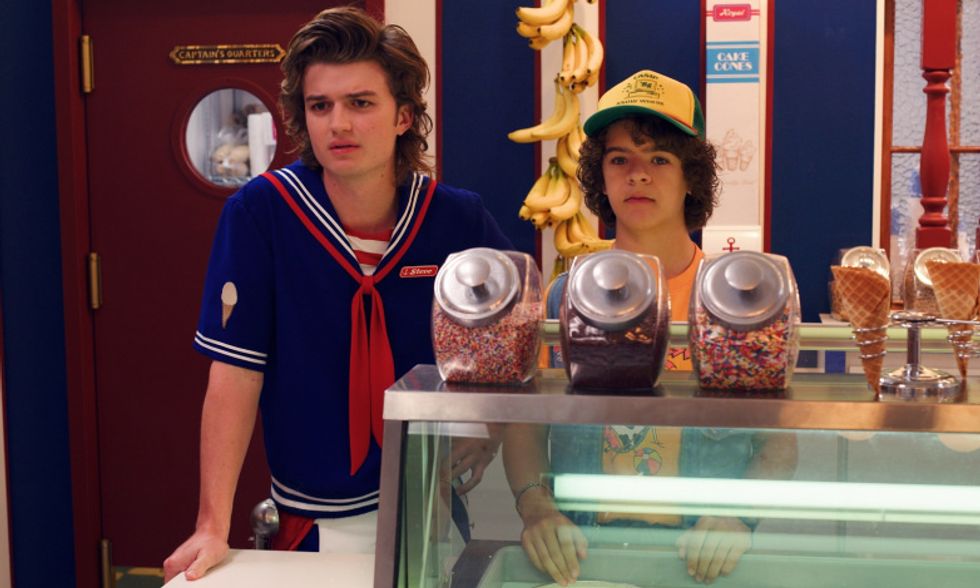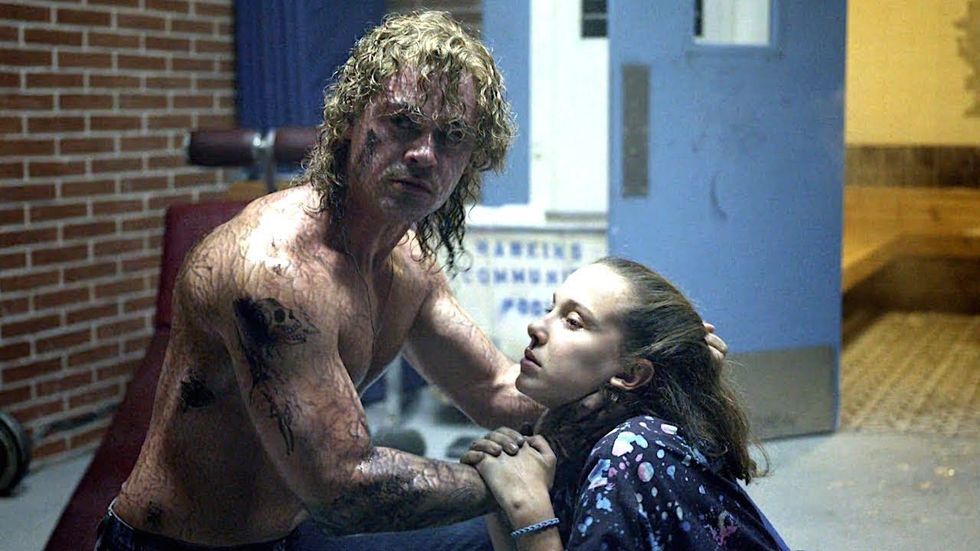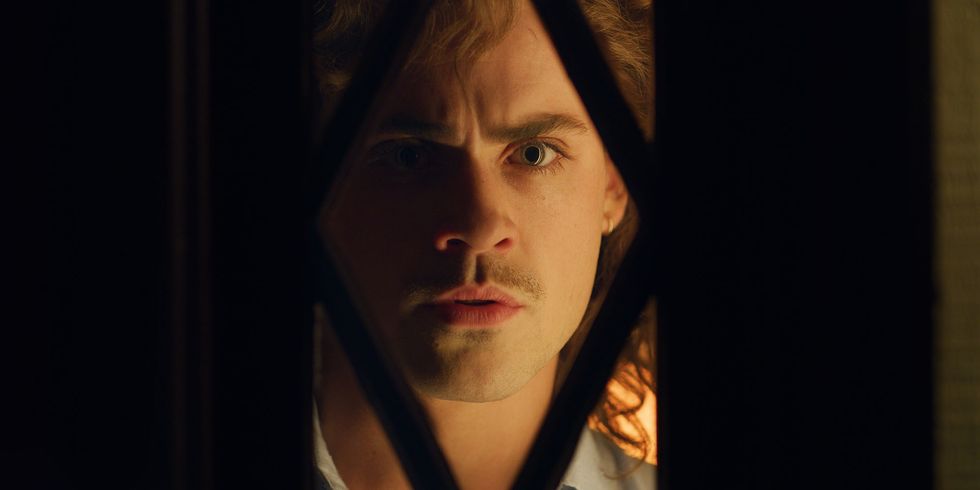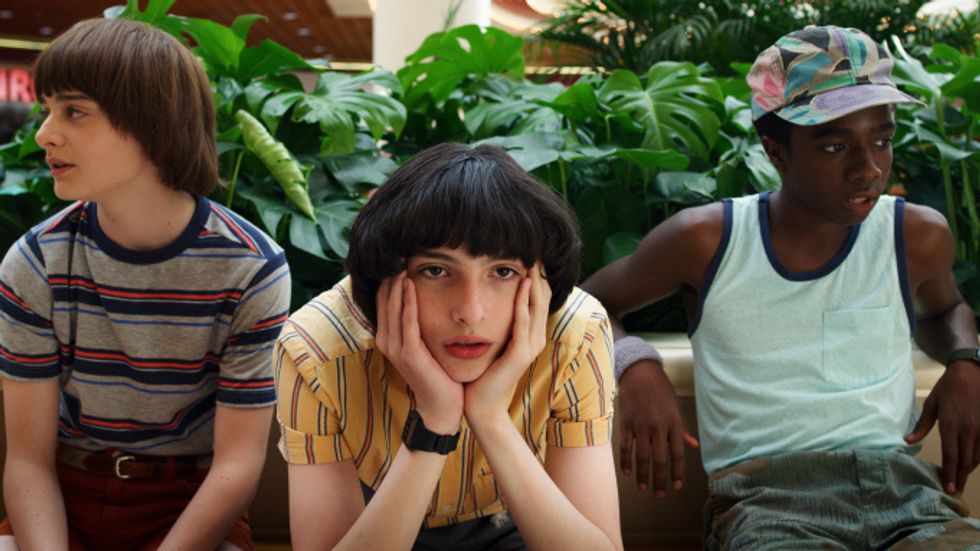Warning: Spoilers Ahead.
All I can say to really prepare viewers for season 3 of Stranger Things is that the show is not at all what it once was. For better and for worse, this series has changed. Back in 2016, the show was a low-budget hit, exploding into the forefront of pop culture not only for its homages to classic '80s cinema and culture, but also for its wonderful character arcs and its commitment to fleshing out and subverting our expectations of dated character archetypes. Season two, while not as magical as the first season and lacking some of the same creative spirit, was still well-received and emulated themes and character techniques similar to season one.
But season three? Well, maybe it's because of the nearly two year hiatus between seasons two and three, but the show feels incongruent from the previous seasons. True, there are many moments that suddenly ring with the same character as the first two seasons, but in general this season feels like the odd man out, and that's hardly a good thing in this case.
To be clear, if you're only really a fan of the series in passing, or if you're relatively easy to please in terms of film and tv, then this season might just do it for you. It's fun and funny, as well as beautifully shot and incredibly scored. There's plenty of camp that you'll be sure to get a kick out of as well as lots and lots of Carpenter-esque gore to make your skin crawl. It's by far the brightest and funnest season, and yet also the most twisted and depraved. If you just want to coast through the episodes without examining anything too critically and enjoy the show's surface level entertainment for what it is, I urge to go on ahead and appreciate the show for what it has become.
However, if you're a die hard fan who is deeply invested in these characters and their development, or if you're a more discerning and critical audience member, then this season will surely be a difficult one, in spite of its pretty sets and many moments of campy levity.
Now, given that I am both of the above things, this season was nothing short of agonizing for me. This is not to say that the season was out and out bad. In fact, I had a lot of fun with it and it certainly made me laugh far more than the first and second season. On a surface level, I was entertained and I can completely understand why some people really liked this season overall. My problems with the show are on a deeper, thematic level, which is why they struck me so personally and why I can't easily let them go.
Again, if you enjoyed the show, I am extremely happy for you and I wish that I could say the same. I am envious of everyone who was satisfied with the newest season and the last thing I want to do is spoil your fun. Go in peace and be happy. God knows I'd love to be in your shoes.
But unfortunately, I am stuck with the curse of being something of a nitpicky asshole, so if you're still game, I'll present you with a quick rundown of some of the major elements in season three of Stranger Things that I feel need some closer examination and a bit of criticism.
The Plot(s)

Dustin and Steve at Scoops
https://boygeniusreport.files.wordpress.com/2019/07/stranger-things-3.jpg?quality=98&strip=all&w=782
Look. While I loved watching the kids run around the mall, go on adorable shopping montages, and stumble into their own awkward tween romances, these scenes took up far too much time in the first half of the season and were far too airy to give true character development to the young cast.
I thoroughly enjoyed watching Eleven carry on full conversations and suffering through a tween romantic subplot, as well as watching the other kids goofing around. But I could only stomach so much fluff for so long without wondering how much more expansive and impactful each episode could have been had a sliver of time been spent showing us a glimpse of deeper personal issues that the Duffers seem to have forgotten.
For example, why don't we get another, deeper look at Max's home life, where she lives with a violently abusive father figure, a disturbed brother, and a yet-to-be-characterized mother? Both her and Billy are still very new characters to us, and for the most part we get fluff or gore with only fleeting snapshots of what the Hargrove household is like, all of which are contained in the same minute-long flashback with a different actor playing Neil Hargrove, no Max, and no Susan.
How could that be left so underdeveloped when Billy and Max became such pivotal parts of the plot this season? Why did they move to California? Why is there relationship so much better than the hateful, spiteful one we saw in season two? Why are the showrunners glossing over these details that they once treated with such care?
What happened to the techniques of season two, where viewers felt like they were steadily being immersed into the characters' lives and we were always learning more information about the personal struggles of the characters just when we thought we had it figured out? What about that unexpected but rewarding snapshot of the Henderson or Sinclair household that we didn't know we wanted?
Season three makes such a bold claim of being bigger and better than ever before, but despite all the glitz and glamor and guts, the characters feel shrunken and a bit flat. It's all fun to watch, but that's precisely the problem: it's all fun. It's all very surface level, until suddenly it's not, and we have dramatic and horrific scenes and subplots that feel incongruent with the jovial "summer fun" of the season.
Maybe if the five plots--the Russian plot, Mind Flayer plot, the Kids plot, the Scoops plot, and the Journalism plot--had intersected more fully and played off of one another in more interesting ways, this whiplash could have been avoided, but as it stands the five plots remained far too isolated from one another and took the characters with them, sectioning everyone off into their own mini-shows that had large differences in tone, weight, and even level of acting.
The greatest example of this disparity is comparing the scenes of the Mind Flayer possession plot with the simultaneous scenes of the kids running amok across Hawkins and dealing with their relationship drama. The former is a harrowing arc that results in the deaths of over thirty people and the mental and physical torture of Billy, a central character this season, as he's helplessly enslaved by the supernatural and forced to murder innocent people, all while reliving his worst memories as fuel for the monster.
This plot is horrific and rich with the weight of a character going from out and out antagonist to victim and, eventually, unlikely hero. Then, just after we've witnessed Billy and other victims weeping and screaming in despair, we cut to scenes of the kids goofing around or Nancy getting laughed at in these over-the-top scenes of her goofily misogynistic bosses. Ultimately, it ends up feeling like I'm watching two very different shows. The problem is, I definitely like one show more than the other, and in turn it's more than a little frustrating when scenes of Max desperately trying to reach out to her brother, scenes that begin to establish some beautiful character dynamics, are distracted by campy, pointless scenes such as when Dustin sings the entire song from The Neverending Story with his new girlfriend.
It makes the ending, particularly the deaths of Hopper and Billy--as well as the Byers's move away from Hawkins with Eleven in tow, feel sorely undeserved. It oddly undercuts and deflates the power of these tragic scenes instead of balancing them out. Instead of saying, "I'm glad they got to enjoy themselves while they still could" and enjoying the summer fun while it lasted, I'm left irritated that so much terror was allowed to crash down on the heads of unsuspecting townies while the main cast lazed around the mall and complained about their girlfriends.
Clearly, this season brought out the most spiteful part of me, which is probably exacerbated by the fact that I had such high hopes for this season. In fact, I had really hoped for it to be the best of the bunch with its greatly expanded budget and its sprawling new version of Hawkins during summertime.
Character Arcs (?)

Possessed Billy strangles Eleven
https://i.ytimg.com/vi/JH1EHgTSGh8/maxresdefault.jpg
I've already been ranting for far too long, so I'll just be brief with this one: Character arcs? What character arcs?
Character arcs would imply that each major character has a beginning, middle, and final stage of development that sees them undergo an important internal change. And in reference to season three of Stranger Things the only characters that truly undergo a critical change or that grow in some markedly significant way are Billy, Joyce, and Hopper. Billy's change, of course, is the most dramatic ,so let's unpack his journey as an example:
Billy goes from being a conceited, broken asshole who terrorizes children due to his own abusive home life to being a tragic hero. His vicious bully persona is pulled back to reveal a victimized teen who is willing to give up his life for a girl that reminded of the brief moments of happiness and peace that he once had.
Beginning, middle, and end with a critical change orchestrated throughout. That's a character arc.
Now let's quickly look as some of the other characters:
Dustin gets a girlfriend. Nobody believes she's real, and it frustrates him for a bit that everybody's doubting him, but eventually he proves them wrong and sings a song with his genius Mormon beaux.
Steve becomes friends with Robin. His new lesbian bestie, she is the last domino that seals Steve's complete transformation from entitled, preppy, and homophobic (we haven't forgotten S1, Steve) asshole to sweetheart and fully-reformed mean girl. That's some good stuff, but it's still a far cry from his nuanced development from asshole to beloved soccer mom across seasons one and two. Other than that, he's got a good amount of action with the Russians and advances the Scoops plot, though for some reason the literal torture he endures flows right off of him like water off a duck's back.
Lucas dates Max and engages in the action, but nothing internal has shifted within him and he's mostly there to advance the irritating teen romantic subplots of the story.
Max almost has an arc, but this is mostly by proxy of her interaction with Billy's story. She is dating Lucas and becomes friends with Eleven. They goof around some, and then things finally start to pick up some weight when she tries to save her brother, shedding some light on their shared home life and the domestic dramas that were once at the heart of this show.
Nancy and Jonathan fight for a bit because their work lives have driven a wedge into their relationship. This is abruptly solved when the major editors of the Hawkins Post are consumed by the Mind Flayer about half way through the season, and they save the day in typical hero fashion and make up at the end of the show.
Do you see what I'm saying?
It's all pretty amusing, but there's a lack of depth, substance, and meaningful character interactions and epiphanies in a show that was beloved for the way that it handled its characters.This aspect was perhaps the most disappointing part of the season.
The Acting

Billy watches Eleven
https://ksassets.timeincuk.net/wp/uploads/sites/55/2019/07/J11_promo_stills_022519.0034_R-1.jpg
This was a problem that I never thought that I would have to nitpick for Stranger Things. The child actors have always been phenomenal and with such big names as Winona Rider and now Cary Elwes installed into the main cast, the acting on this show was always first class even if the script and story had their ups and downs.
As with most of my other complaints, I just don't know what happened this season. The acting was by no means bad—in fact, some of the best performances of the entire series are given in this season. In particular, Dacre Montgomery delivers an absolutely stunning performance from start to end. It's no surprise that Millie Bobby Brown, too, shows off some strong acting chops, specifically in her tear-filled interactions with Dacre Montgomery, and the two play off of each beautifully as they grapple with the throes of Billy's possession and Eleven's desperation to destroy the Mind Flayer, further enriching that part of the story and inadvertently putting other storylines to shame.
However, for some reason, some of the newer additions to the cast, specifically Maya Hawke, as well as the returning cast of child actors, were not so consistent in their performances. Given the fact that Hawke is a new character inserted into one of the weaker plots and just getting a feel for her role, her performance is perfectly serviceable, if a little flat in some places.
As for the crew of kids, the material for the show changed quite a bit this season and the mood has shifted, so I can see where it was difficult for them to get their footing. Or maybe the problem is that the cast is fighting an uphill battle against the huge expectations that have been set against them after their stellar performances in seasons one and two. The script itself could also be at fault, giving the kids too much tween fun and not enough rich and complex interpersonal drama, but I'm just not sure. All I know is that, barring some great moments and a handful of incredible performances, the acting was not at the same level as in previous seasons.
The Verdict.

Mike, Lucas, and Will at the mall
https://pmcdeadline2.files.wordpress.com/2019/07/stranger-things-3-gang.jpg?w=681&h=383&crop=1
All in all, the show is still fine. It's still charming, funny, well-shot, nostalgic, and emotional, but it's not the same show that we once knew. The focus of the storytelling and the mood took an odd turn this season, vacillating between romp and heavy, terrifying drama. The focus is torn and the writers have become myopic in terms of the content that they believe should be given screentime.
Many characters and locations that could have solidified the characters and made them feel less shallow and airheaded, specifically the Hargrove household, are left out of the story and undermine the beautiful and tragic ending to the season. The story feels as if it kind of drifts and stumbles to a climax rather than building towards one, and the deaths of two major characters are made frustrating by the fact that they were put at odds with the weaker scripts of other plots, which retracted from the full realization of their arcs.
The verdict is that, despite the efforts of its team of writers to create an emotionally resonant and harrowing season that strikes viewers in the heart at the last moment yet balances its tragedy with guts and goofs, in reality they have created an enjoyable but frustrating summer blockbuster for passing fans to enjoy for the season. This summer, while we may be disappointed at the show's inability to do proper justice to its previous seasons and treat the deaths of Hopper and Billy with the weight and exploration that they deserve, we're still thankfully left with some dumb summer fun.
- Episodes of Stranger Things season 3 and their decoding ›
- 6 Things I Hope To See In 'Stranger Things' Season 3 ›
- Why "Stranger Things" needs to recast Nancy Wheeler ›
- Five Combat Tips to Stay Safe in Stranger Things 3: The Game ... ›
- What Is Billy's Purpose in Season 3 of 'Stranger Things'? - The Ringer ›
- Stranger Things: Massive Billy Arc Shocked Dacre Montgomery ... ›
- Stranger Things (season 3) - Wikipedia ›
- 'Stranger Things 3': A Guide to the Major Pop Culture References ... ›
- That Stranger Things 3 postcredits scene, explained - CNET ›
- Stranger Things 3: The Game on Steam ›
- Stranger Things - Rotten Tomatoes ›
- Stranger Things 3 | Official Trailer [HD] | Netflix - YouTube ›
- Stranger Things | Netflix Official Site ›



















